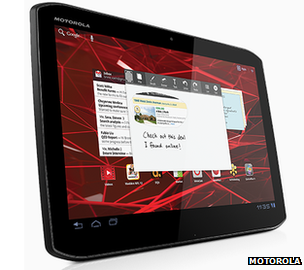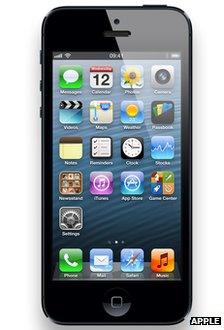Google Motorola faces German ban after Apple victory
- Published

Motorola faces having to revise the way its lists function on its tablets and handsets
Google's Motorola unit faces being forced to recall its Android tablets and smartphones from Germany after losing a patent lawsuit against Apple.
The case relates to one of the innovations at the heart of an earlier US case in which Samsung was defeated by the iPhone maker.
The dispute focused on the iOS system's bounce-back list feature, external which Motorola was found to have infringed.
Apple has to formally request a sales ban before it would come into effect.
Google has not issued a statement, but is expected to appeal.
Workaround
The ruling was issued at a court in Munich on Thursday.
Google had challenged the validity of the patent which describes a way to make a list react as if it was on a rubberband when a user scrolls beyond its end.
The search giant has also filed a separate challenge against the intellectual property with the European Patent Office.
Tech consultant Florian Mueller - who advised another tech firm recently involved in a lawsuit against Google - said it would be relatively easy for the search giant, external to revise its software to mean it no longer risked a patent infringement.
The basic version of Google's Android operating system displays a glow effect when a user reaches the end of a list. So, the firm could revise an adapted version used on Motorola devices to abandon their use of an added bounce-back feature.
However, he added that if Apple posted a bond of 25m euro ($32.6m; £20.1m), it could now force the devices off shop shelves, and for an additional sum it could have them destroyed or recalled.
Motorola briefly forced Apple to stop selling some of its iPads and iPhones in Germany in February after a separate lawsuit.
Co-founder's concern
While the ruling adds to Apple's patent victory tally, the firm's co-founder Steve Wozniak has voiced his discomfort at the fact it was engaged in such legal battles.
"I hate it," he said, when quizzed by the Bloomberg, external about the fact that a jury had awarded Apple $1.05bn (£648m) in damages from Samsung.

Samsung might sue Apple over its use of 4G LTE technologies
"I don't think the decision of California will hold. And I don't agree with it... I wish everybody would just agree to exchange all the patents and everybody can build the best forms they want to use everybody's technologies."
Mr Wozniak is the listed inventor of several patents himself, external, including a way to use a computer with a video display.
Patent defeat
Although the US jury's verdict was delivered last month, the judge has scheduled two further hearings to discuss device bans in the country, and must still issue a final ruling on the sum owed.
Samsung has said it intended to appeal.
The Galaxy phone-maker's patent fortunes suffered another setback on Friday when a judge at the US's International Trade Commission ruled that Apple had not infringed four of its patents in a separate case.
The technologies involved a method to call a number on a smartphone, external and ways to view digital documents, external.
The judgement was a preliminary ruling, meaning it is subject to the review of a six-member panel of judges at a later date.
Some analysts believe the Samsung might now opt to make use of its 4G technology portfolio to issue a further challenge.
The new iPhone 5 includes a chip giving it access to high-speed data transfers on 4G LTE networks.
Speculation was fuelled by a comment by one of the firm's executives earlier in the week.
"We have several cards, such as LTE patents," Samsung's IT and mobile unit chief Shin Jong-kyun said.
"But we are cautious since [Samsung] has business ties with Apple in the component sector."
- Published3 September 2012
- Published8 March 2012